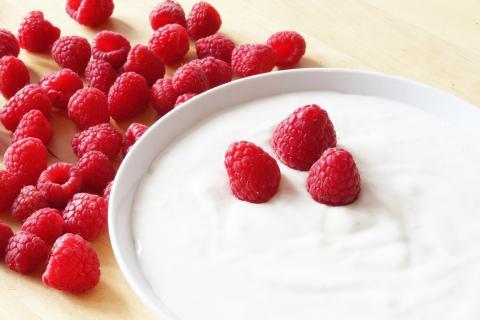
Coconut yogurt is almost as ubiquitous as dairy yogurt, and can be found alongside typical fruit-filled yogurt cups, Greek yogurt tubs, and even almond milk yogurt. While often pricier than its dairy-counterparts, coconut yogurt has just as many, if not more, benefits—without the sometimes disastrous side effects.
Made almost entirely from coconuts alone, coconut yogurt is rich in probiotics. This also makes it much richer in taste, thanks to high levels of medium-chain fatty acids. While lower in protein than traditional yogurts, coconut yogurt is often a better alternative for those who are lactose intolerant, in addition to being an animal-free option for vegans and vegetarians.
Here are just a few reasons to give coconut yogurt a try:
- Rich source of probiotics. Studies have been slow to consistently demonstrate the benefits of probiotics, but most doctors, nutritionists, and health researchers will be quick to explain the studies that have been proven. For those suffering from diarrhea, irritable bowel disease, Crohn’s disease, and several other digestive disorders, probiotics can be very favorable, as this study suggests.
- High in saturated fats. Hold up—isn’t saturated fat bad? It depends. The saturated fat in coconut yogurt is mainly made up of medium chain fatty-acids, which can contribute to weight loss thanks to their satiety-boosting taste.
- Good source of fiber. Probiotics need prebiotics to survive, and the more fiber in your diet, the better your prebiotics. A serving of coconut yogurt typically contains 3-5 grams; add blueberries or sprinkle on flaxseeds, and you’re doing even better.
- Low in sugar. Coconut yogurt naturally contains no sugar, unlike dairy. While tangy, coconut yogurt pairs well with fresh fruit, homemade granola, or a drizzle of raw honey for a sweeter treat.
- Versatile. Thanks to its tangy taste, coconut yogurt works as a substitute in several dishes. Use in place of sour cream, Greek yogurt, creme fraiche, and dairy yogurt in most recipes.
- Tastes delicious. Most importantly, coconut yogurt tastes great.
While more and more brands are coming out with coconut yogurts, it’s possible to make your own at home using little more than coconut cream, probiotics, and a mason jar.
Easy Coconut Yogurt Recipe
Use this recipe as your base—it’s so simple it feels like cheating.
Ingredients
- 1 can full-fat organic coconut milk (make sure there are no additives or sugar!)
- 2 probiotic capsules (if vegan, you’ll want to ensure these are vegan, too)
- 1 clean mason jar with lid
Instructions
- Pour full contents of coconut milk can into mason jar. Empty 2 probiotic capsules and add to jar, then stir, using a wooden spoon, to combine.
- Screw lid tightly, and sit somewhere slightly warm. A good choice might be next to the stove, the fridge, or in a warm cupboard.
- After 36 hours, test your yogurt. If it’s not tangy enough, leave it a little longer. If it tastes delicious, use as needed and keep in fridge.
**Please note that if, for whatever reason, your yogurt tastes especially sour or has an offensive smell or color, ditch the batch and start again! This can often happen when proper ingredients are not used.
Not interested in making your own? Look for brands that are local to your area, and try adding the following toppers to boost your coconut yogurt bowl.
Toppings Ideas for Coconut Yogurt
- Hemp seeds
- Flaxseeds
- Bee pollen
- Spirulina powder
- Chlorella powder
- Reishi mushroom powder
- Raw honey
- Pure maple syrup (grade B, if possible)
- Cacao nibs
- Dried mulberries
- Goji berries
- Blueberries
- Raspberries
- Blackberries
- Granola
- Puffed quinoa
- Puffed brown rice
Have you made coconut yogurt before? What’s your favorite way to consume this probiotic treat?








